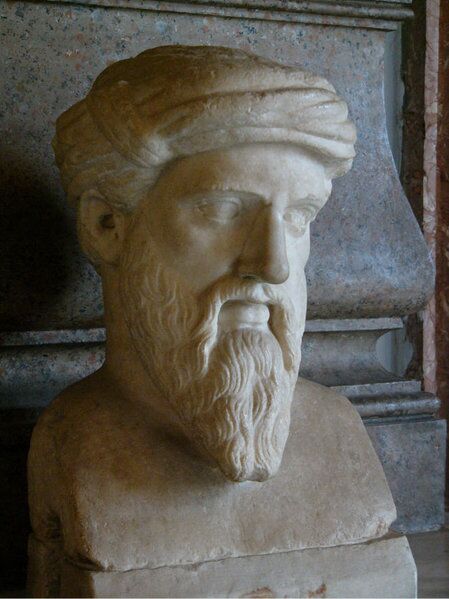Pythagoras najznámejšie citáty
Pythagoras Citáty o bohu
Pythagoras citáty a výroky
„Mlč, alebo povedz niečo, čo je lepšie ako mlčať.“
Prisudzované výroky
Varianta: Buď mlč alebo povedz niečo, čo je lepšie ako mlčanie.
„Najkratšie odpovede – áno a nie – vyžadujú najdlhšie rozmýšľanie.“
Prisudzované výroky
Varianta: Najkratšie odpovede ÁNO a NIE vyžadujú najdlhšie premýšľanie.
„Snažte se ovládat čtyři věci - žaludek, spánek, sex a prchlivost.“
Varianta: Snažte sa ovládať štyri veci: žalúdok, spánok, sex a prchkosť.
Prisudzované výroky
Varianta: Otužuj telo! Nepodávaj mu viac potravy ako treba. Nepoužívaj omamujúce nápoje! Otupujú jemnocit a ochromujú dušu.
„Ľudia sami si spôsobujú všetky starosti.“
Varianta: Vieš, že ľudia sami si pôsobia všetky svoje strasti?.
Pythagoras: Citáty v angličtine
“Use examples; that such as thou teachest may understand thee the better!”
The Sayings of the Wise (1555)
“There are men and gods, and beings like Pythagoras.”
Of himself, as quoted in A History of Western Philosophy (1945) by Bertrand Russell
“Tell not abroad what thou intendest to do; for if thou speed not, thou shalt be mocked!”
The Sayings of the Wise (1555)
“Order thyself so, that thy Soul may always be in good estate; whatsoever become of thy body.”
The Sayings of the Wise (1555)
“Concern should drive us into action and not into a depression.”
The Collected Works of Karen Horney (1957) by Karen Horney, p. 154: "We may feel genuinely concerned about world conditions, though such a concern should drive us into action and not into a depression."
Misattributed
As reported by Heraclides Ponticus (c. 360 BC), and Diogenes Laërtius, in Lives and Opinions of Eminent Philosophers, "Pythagoras", Sect. 6, in the translation of C. D. Yonge (1853)
“True and perfect Friendship is, to make one heart and mind of many hearts and bodies.”
The Sayings of the Wise (1555)
“The best and greatest winning is a true friend; and the greatest loss is the loss of time.”
The Sayings of the Wise (1555)
“Above and before all things, worship GOD!”
As quoted in The Sayings of the Wise: Or, Food for Thought: A Book of Moral Wisdom, Gathered from the Ancient Philosophers (1555) by William Baldwin [1908 edition]
Variant translation: Honor first the immortal gods, in the manner prescribed, and respect the oath.
Next, honor the reverent heroes and the spirits of the dead by making the traditional sacrifices.
Honor your parents and your relatives. As for others, befriend whoever excels in virtue.
Yield to kind words and helpful deeds, and do not hate your friend for a trifling fault as you are able. For ability is near to necessity.
As quoted in Divine Harmony: The Life and Teachings of Pythagoras by John Strohmeier and Peter Westbrook. (1999) ISBN 0-9653774-5-8
The Golden Verses
Symbol 9
Variant translation: Poke not the fire with a sword.
As quoted in Short Sayings of Great Men: With Historical and Explanatory Notes (1882) by Samuel Arthur Bent, p. 455
The Symbols
As quoted in the translation of Thomas Taylor (1818)
Florilegium
“The most momentous thing in human life is the art of winning the soul to good or to evil.”
As quoted in Lives and Opinions of Eminent Philosophers, as translated by Robert Drew Hicks (1925)
Variant translation: The most momentous thing in human life is the art of winning the soul to good or evil.
As quoted in Ionia, a Quest (1954) by Freya Stark, p. 94
“Not frequently man from man.”
As quoted in the translation of Thomas Taylor (1818); This has been interpreted as being an exhortation to moderation in homosexual liaisons.
Florilegium
Symbol 37; This was long thought by many to be simply a dietary proscription, and often ridiculed, but many consider it to have originally been intended as advice against getting involved in politics, for voting on issues in his time was often done by using differently colored beans. Others have stated that it might signify a more general admonition against relying on the votes of people to determine truths of reality. The explanation provided in the translation used here states: "This Symbol admonishes us to beware of everything which is corruptive of our converse with the gods and divine prophecy."
The Symbols
Varianta: Abstain from animals.
As quoted in The Diegesis (1829) by Robert Taylor, p. 219
Symbol 30; explained in the edition used here: "This Symbol signifies that it is not proper to divulse the union and consent of the universe. And still further it signifies this, Be not envious, but philanthropic and communicative; and from this it exhorts us to philosophize. For philosophy alone among the sciences and arts is neither pained with the goods of others, nor rejoices in evils of neighbours, these being allied and familiar by nature, subject to the like passions, and exposed to one common fortune; and evinces that all men are equally incapable of foreseeing future events. Hence it exhorts us to sympathy and mutual love, and to be truly communicative, as it becomes rational animals.
Variant translation: Do not eat your heart.
The Symbols
Attribution to Pythagoras by Ovid, as quoted in The Extended Circle: A Dictionary of Humane Thought (1985) by Jon Wynne-Tyson, p. 260; also in Vegetarian Times, No. 168 (August 1991), p. 4
